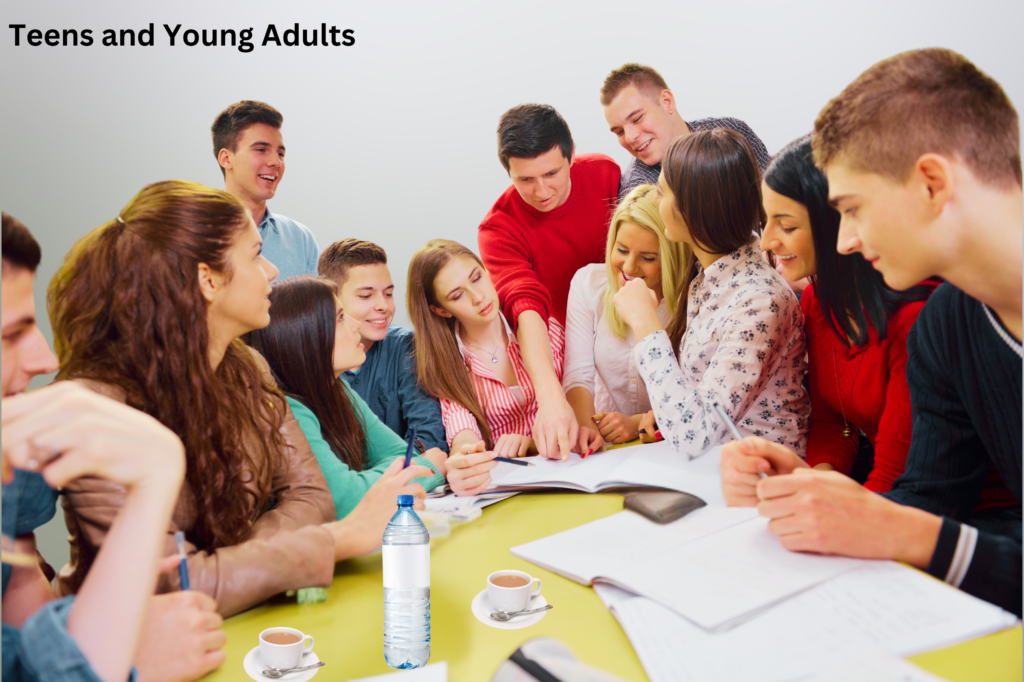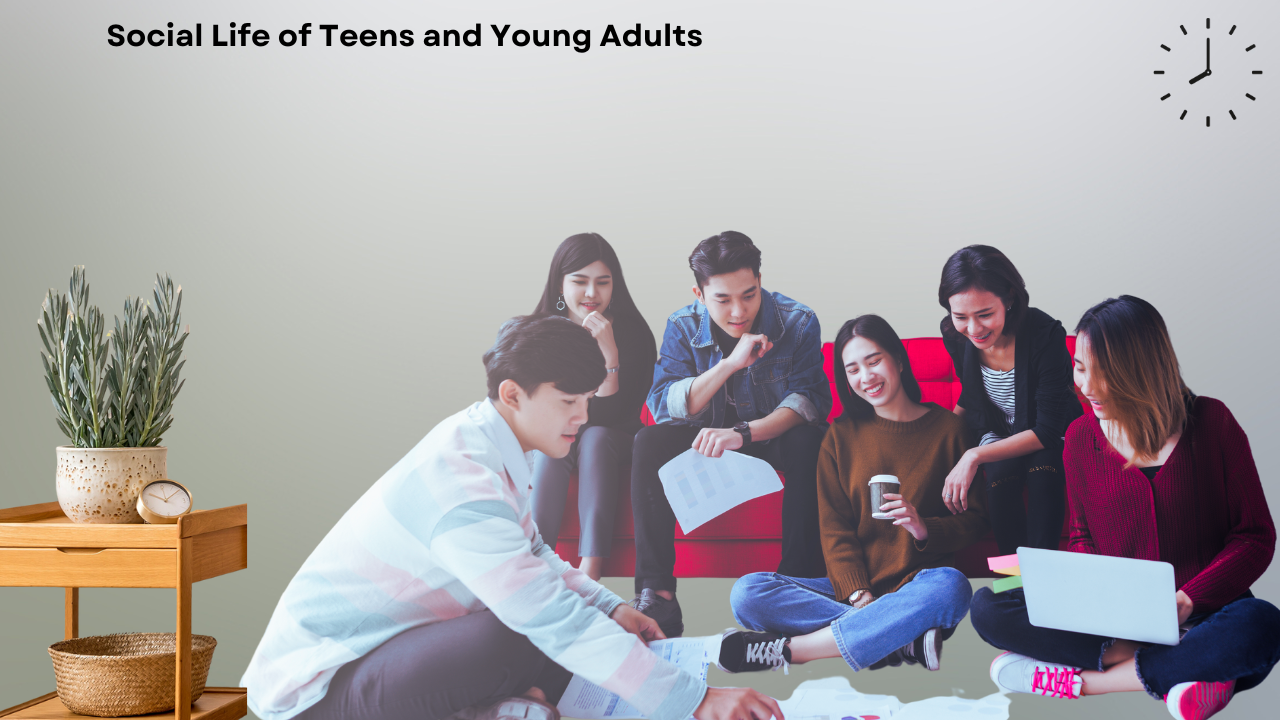It studies how and why teens and young adults act, what they do, and how they feel about society. Between 12 and 24, this is a significant time in your life for working out who you are. Society experts study how teens interact with family, friends, and others. They study how schools, culture, and the media shape society. You can better understand how kids grow as people and deal with the world around them if you know these things.

Youth Identity Formation
Creating a sense of self is one of the most essential parts of being a teenager. Teenagers start to think about who they are and where they belong in society. It means talking about ideals, beliefs, and plans for the future. Family and culture are essential in this process, but friends and the media are also critical. As teens and young adults move through this time, they face problems shaping their identity.
Peer Influence on Adolescents
Peers have a significant impact on how teens act and what they think. That time of year, teens and young adults often hang out with their friends more than they do with their families. Some people’s friends can affect what they wear, what music they like, and how they act. Good friends can help you keep good habits up. Bad friends, on the other hand, can push you to do bad things. Understanding a few social trends you see in youth culture helps you learn about the role of friends.
Family’s Role in Adolescence
Family is an integral part of teens learning to get along with others. For young people, their parents and brothers are their first and most important social contacts. Teenagers’ views on the world can be affected by their family’s beliefs, the way they talk to each other, and their support networks. Strong family ties can protect you from harmful influences, but fights within the family can make kids look for acceptance elsewhere, like from their friends.
The Impact of Media on Youth
Media has a significant effect on the lives of teenagers. Because of the popularity of social media, young people are constantly seeing and hearing about new things. How the media portrays beauty, success, and fame can change how young people see themselves. Media often sets lofty goals, making people feel they need to improve. On the other hand, it can also give people good examples to follow and ways to show themselves.
Education and Youth Development
School is an excellent place for teens to learn how to get along with others. Not only does school teach people the things they need to know to be adults, but it also changes who they are as a person. Schools are fun places for kids to hang out with friends and learn to act around others. The views and goals of students can be shaped by their teachers and mentors. Clubs and sports teams at school offer opportunities to make friends and develop social skills.
Adolescents and Social Class
Class affects how young people live their lives in a big way. Teenagers from all kinds of social groups have many different problems and opportunities. Rich kids have more opportunities to learn, make friends, and participate in activities outside of school, all of which can help them do well. On the other hand, teens from low-income families may need help with issues like needing more significant assets and being kept out of social groups, and this could hurt their chances in the future.
Gender and Adolescence
Childhood shapes your identity in significant part by gender. Society frequently had unique expectations of men and women during this period. While boys may be urged to show they are strong and independent, girls may feel pressure to fulfill beauty standards and assume caring duties. These social conventions can influence behavior and self-esteem. Teenagers especially should understand how gender roles shape their lives.
Cultural Influences on Youth
Culture significantly affects what and how teens and young adults act. Teenagers are influenced by their neighborhood’s beliefs, values, and customs. It can be challenging for young people in multicultural societies to figure out who they are because of the different ethnic expectations. Because of migration and globalization, Young people must find a balance between their old beliefs and new ideas.
The Role of Religion in Adolescence
Religion can have a significant effect on how a teenager sees it. Many young people use their religious views to help them make sense of the world and decide what to do. Religious groups can help, guide, and make you feel like you belong. However, teens may also have problems balancing their religious views with social norms, which can cause them to question their identity and values.
Youth Rebellion
It is common for teens to rebel when they are young. Young adults and kids this age question authority and social norms. To become independent and find your values is a normal thing to go through. On the other hand, resistance can lead to harmful behaviors like crime or drug use. Sociologists try to figure out how to help kids overcome this challenging time by studying why and how young people rebel.
Teenagers’ Mental Health
Mental health is essential during puberty. The stress, anxiety, and depression that come from trying to figure out who you are, being affected by other people, and living up to social norms can be terrible. It can be challenging for teens to deal with these emotions, especially when they fail to receive the help they need. You should be able to tell when an adult is having mental health issues and help them deal with them by giving them therapy and social services.
Young people and social change
Teenagers are often the first to push for social change. Young people are often more willing to try new things and accept things as they are. Young people usually boost social justice, environmental action, and political change movements. The fact that this group can get together through global networks and social media makes them strong change agents in society.
Technology and growing up
In the 21st century, technology has changed the way teens live. Smartphones, the internet, and social media give people new ways to talk to each other, learn, and express themselves. However, having steady access to technology also comes with some things that could be improved. Teenagers are becoming more and more worried about cyberbullying, addiction, and the spread of false information. Sociologists study how technology changes the way teens act, think, and connect with others.
Adolescents and Risk Taking Behavior
Teenagers often do things that involve taking risks. Teenagers and young adults are more likely to try new things, like risky sports or drugs. Being ready to take risks is a part of finding your independence and personal limits. But doing dangerous things can have nasty effects on your health and safety. Figuring out why teens take risks can help people develop ways to get them to make better choices.
Youth Subcultures
Teenagers’ social lives are shaped a lot by their subcultures. Teens and young adults often make groups because they like the same kinds of music, clothes, or activities, like skateboarding, punk, or hip-hop. In contrast to mainstream society, these subcultures give people a sense of identity and connection. Sociologists study how these groups affect the beliefs, actions, and ways of expressing oneself to the people who belong to them.
Making friends and becoming a teenager
The teenage years are a significant time for socialization, which means learning and accepting the rules and ideals of society. At this time, teens and young adults start interacting with a broader range of people outside their families. Teenagers learn about their jobs, responsibilities, and what society expects of them through school, friends, and the media. How they behave as adults will depend on how they were socialized as kids.
Teenagers and Deviance
It is called deviance to do things against social norms; teens and young adults often try these limits. Small acts of deviance, like skipping school, may be a part of growing up. But more dangerous types, like delinquency, can have effects that last for a long time. Understanding the social factors that lead to destructive behavior can help people devise ways to stop it and support the healthy growth of teens.
Conclusion
The study of teens’ and young adults’ social lives shows how complex and changing this time of generation is. Families, friends, school, the media, and society affect teenagers. Awareness of these issues will help society assist young people more effectively in discovering who they are, developing relationships with friends, and managing their mental health. Solid support systems, advice, and tools can help teens reach adulthood.
